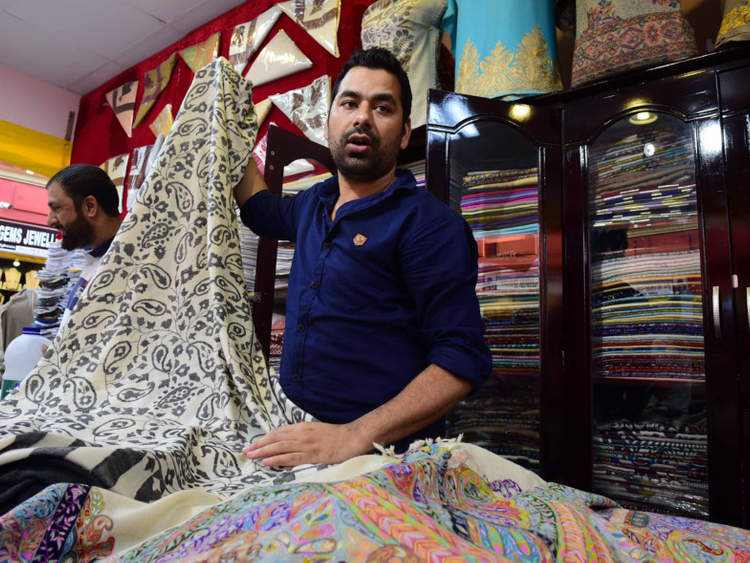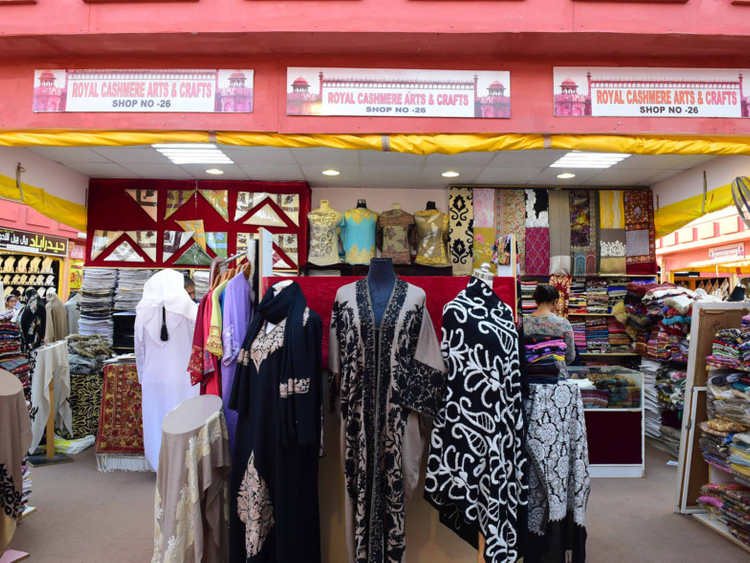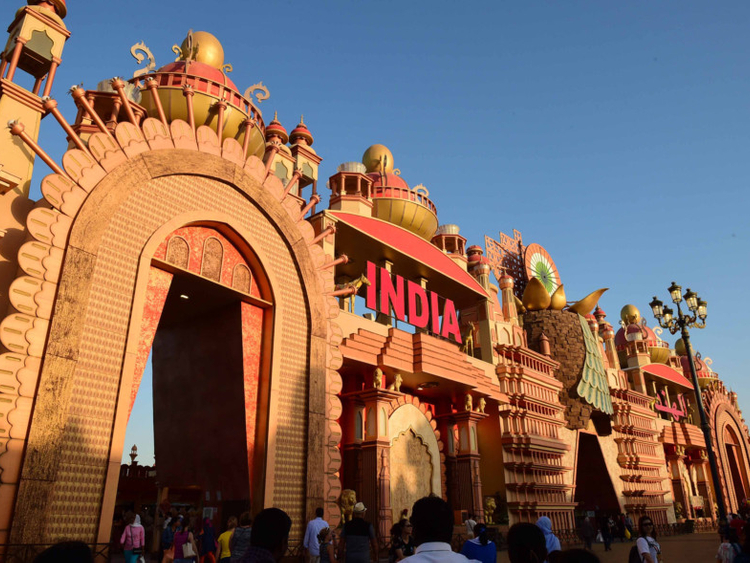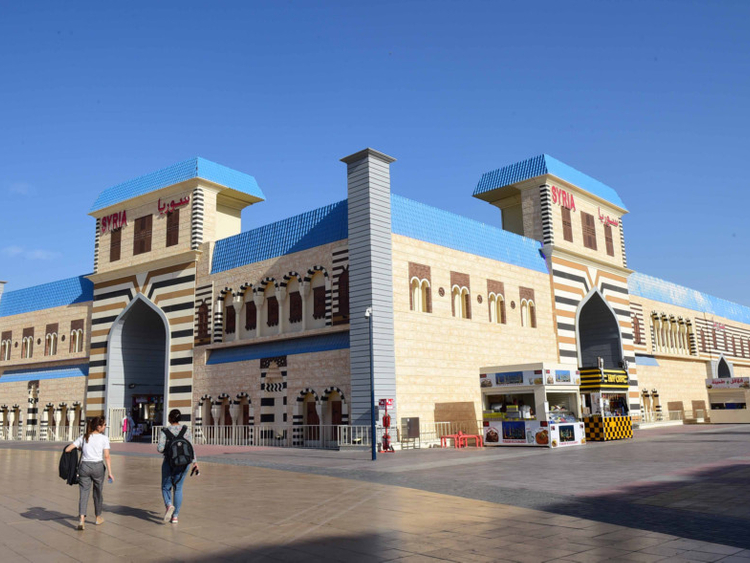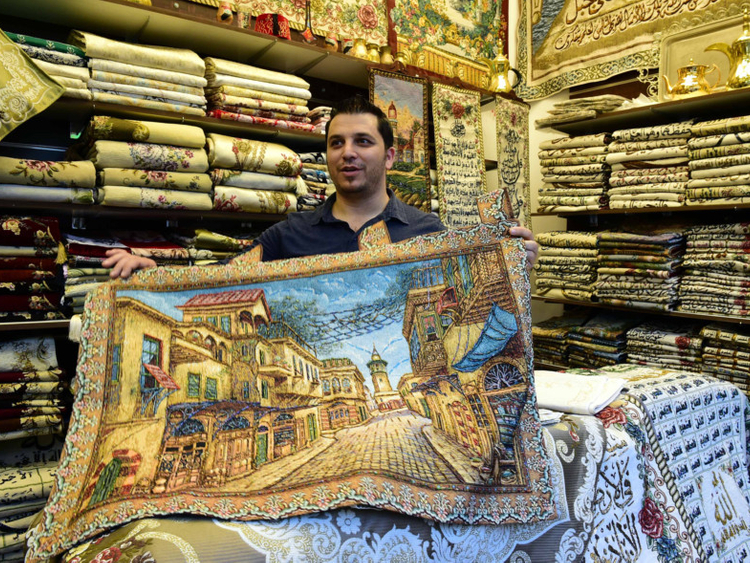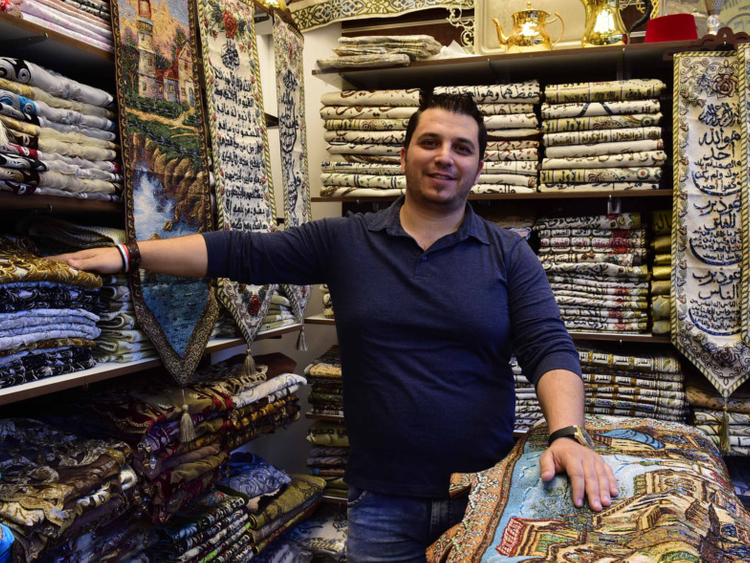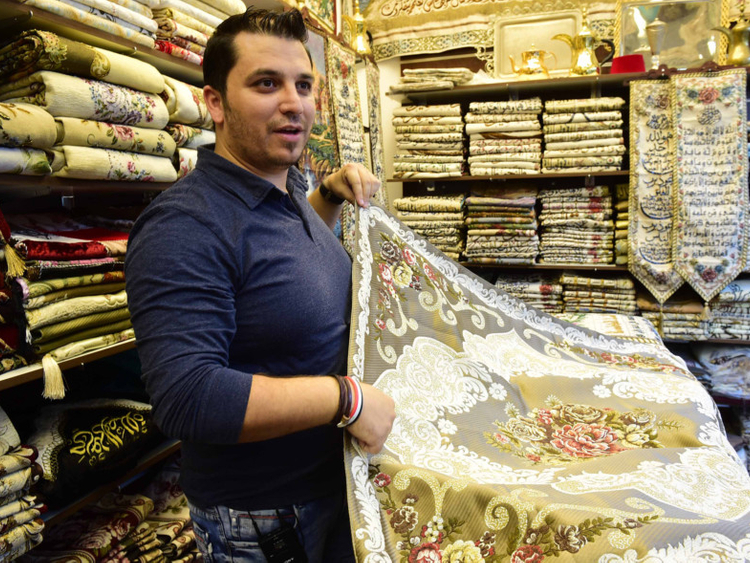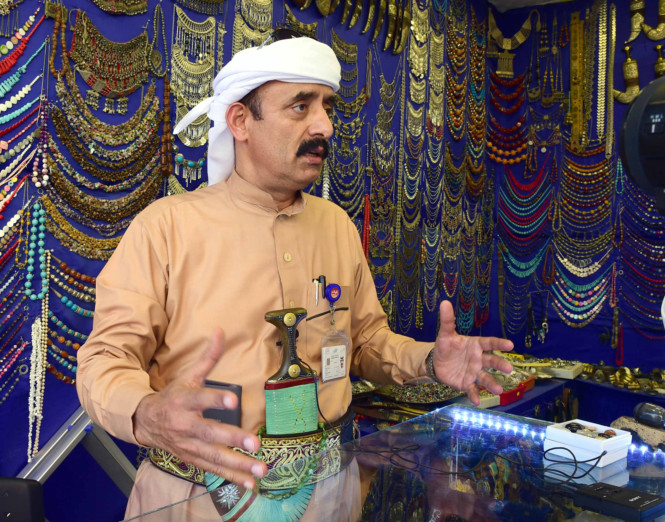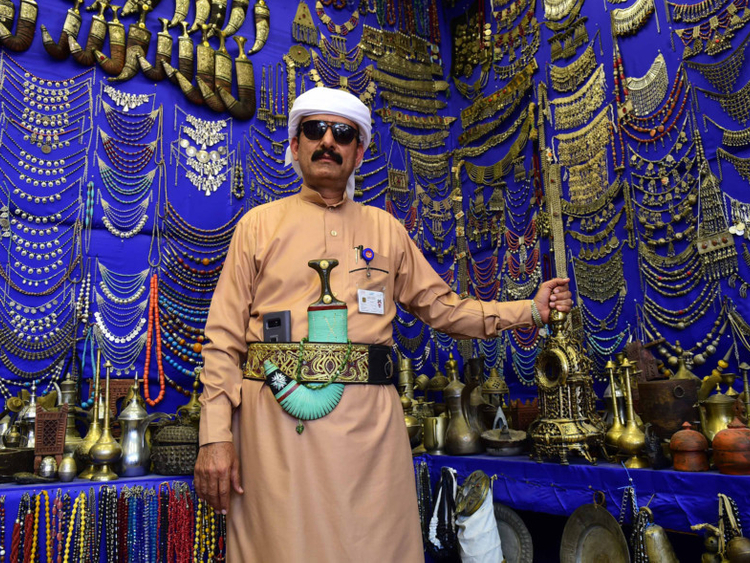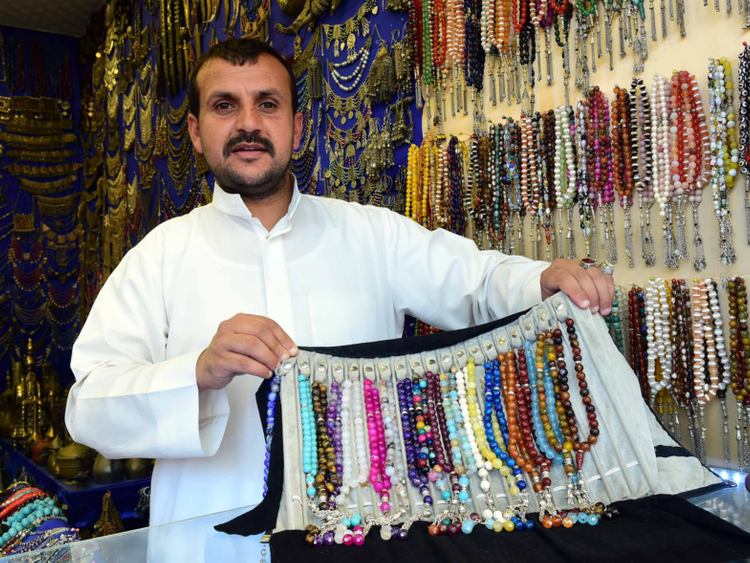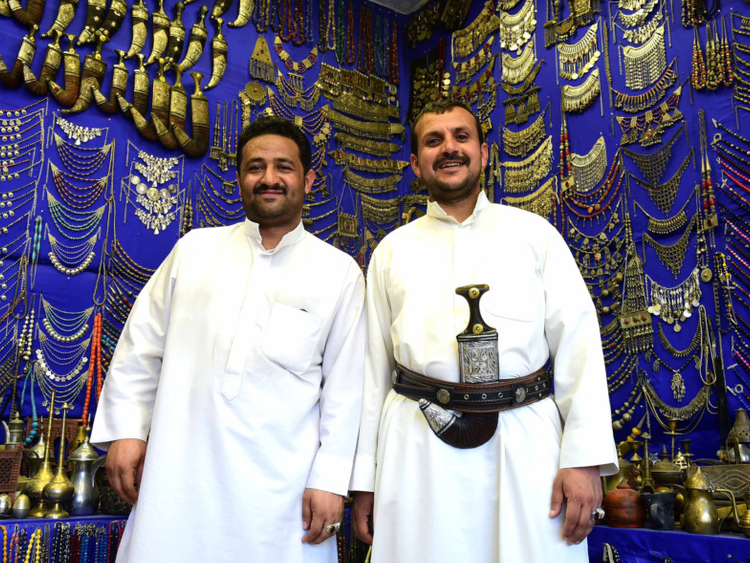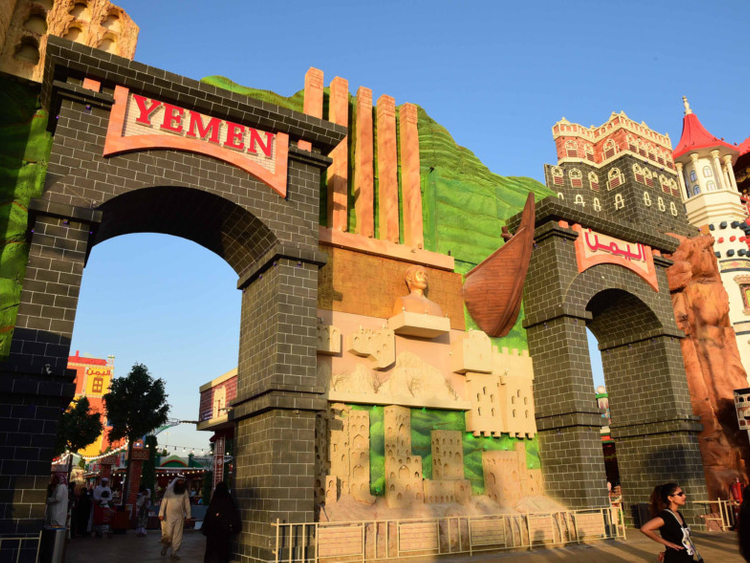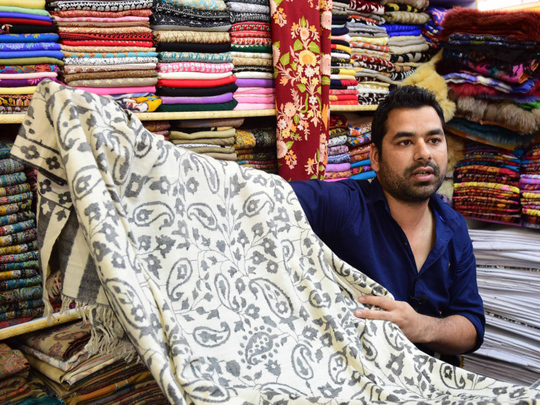
Dubai: Back home, they face distress and pain due to the constant flux of conflict, yet, here at Global Village, they bring with them a slice of culture and heritage they share with a deep sense of pride and joy.
These vendors are doing a wonderful job of refocusing the attention of people on the true cultural strengths of their respective origins. They all said that they continue to take part in Global Village to be able to represent their country’s heritage and to spread the message of peace.
Sami Mohammad Hassan Al Seni and his partner Dhaif Allah Mohammad Nejad, who have been selling Yemeni jewellery, silver, daggers and handicrafts at the Yemeni pavilion for 12 years, speak six languages. They are among the pavilion’s favourite vendors, as they use their language skills to interact and converse with guests from all backgrounds.
Al Seni’s journey from his hometown Thila, 50km from Yemeni capital Sana’a to his Global Village, where he has set up shop for six months, was one with many challenges.
“With the current situation in Yemen, I faced many difficulties to get here this year, and had to drive for six days with my shipment of goods through the Oman border and into the UAE. It really wasn’t easy, but I love taking part in Global Village, and I am happy to be representing my culture,” said Al Seni.
Along with other vendors at the pavilions, his partner was one of the few who were able to obtain a visa and take a two-and-a-half hour flight to the UAE. “As a result of the situation in Yemen as well as visa issues, we were not able to take part in Global Village for two years in 2015 and 2016. But we are here this year, and are happy to meet our guests and regular customers,” he said.
Al Seni and his partner sell everything — from Yemeni antiques to the traditional ‘Akeek’ stone usually incorporated into rings, jewellery and Yemeni daggers.
Another vendor at the pavilion, Qasim Mohammad Musaed Saeed, owns a stall offering various types of authentic Yemeni honey including ‘Sider honey’ and ‘Samar honey,’ used for multiple purposes and known for their healing ingredients.
“Global Village is a special celebration of cultures as it brings together everyone from around the world. Here at the Yemeni pavilion, we try and showcase a small representation of our country’s rich heritage, history and traditions through the products we sell such as the honey, spices, antiques and jewellery,” said Saeed.
He said after the conclusion of the annual festival, vendors will return to their country and prepare for the next edition of Global Village. “Despite the conflict going on in Yemen, the people are staying strong and persevering through the difficulties. We wish peace for the whole region and the world,” said Saeed.
Syria
Tony Bashar Haddad, who is taking part in Global village for the seventh year, is the owner of a stall offering a range of Syrian tablecloths and hand-stitched paintings, as well as traditional Syrian dresses known as ‘Jalabia,’ and handmade prayer mats.
“The situation in Syria is getting better. We sometimes have difficulty in the production of goods, but the country is still standing strong. To participate in Global Village, it took me around 15 days to ship the goods by plane, and 45 days by ship,” said Haddad.
He pointed out that the Syrian pavilion is known for its cotton garments, handmade crafts, as well as foods such as ‘Labaneh’ spread, cheese and Arabic sweets.
“We rely on Syrian customers the most, because they come looking for handmade items and can appreciate Syrian goods and the way they’re produced. We also get a lot of tourists and Emiratis who come every year to buy specific items such as jalabias for schoolchildren and handmade paintings,” said Hadad.
He referred to an off-white traditional table mat with gold designs as a timeless piece that goes back to the 1950s. “Every Syrian bride has to buy this traditional table mat as a part of her wedding preparations. Offering it here at Global Village gives Syrians in the country the chance to purchase it without having to go back home,” said Haddad.
Like many of his neighbours at the pavilion, Haddad will return home to Damascus in April and begin his preparations for the next season of Global Village starting in November.
Kashmir
Vendors from this area at Global Village’s Indian pavilion sell one of their region’s most popular products, Pashmina shawls.
Brothers Aqib and Owais Ahmad, vendors at Global Village, spoke to Gulf News about the types of pashminas and the making process of an item that has become a fashion trend worldwide.
“Pashminas are made from cashmere, which is wool taken from a type of sheep that is found in the mountain areas called ‘Shurus.’ This wool is then taken to factories where it’s made into threads and woven into a shawl,” said Owais Ahmad.
He said each pashmina shawl takes between two and 12 months to make depending on its type, and even longer if hand embroidery is added.
The two main colours of the pashminas are off-white and light brown, while all other multi-coloured pashminas are usually dyed.
“There are a few types of pashminas made in Kashmir — we have the plain pashmina, some with coloured embroidery, and we have ‘Kalamkari’ pashmina, which is first hand-painted on and then hand-embroidered,” explained Ahmad.
Kalamkari pashminas usually take one year to make, and are sold for over Dh8,000 at Global Village.
Another type of pashmina is ‘Kari’, which is woven using more than 100 sticks over a period of seven to eight months, and sold for Dh6,000-7,000.
“What makes these shawls beautiful is the soft wool, and coloured needle work that is handwork by people back in Kashmir,” said Ahmad.
Closing on April 7
Global Village, which opened on November 1, 2017, will close on April 7.
Timings: 4pm-1am (Thursdays and Fridays)
Wednesday to Saturday: 4pm-midnight
Ticket prices: Dh15 per person


